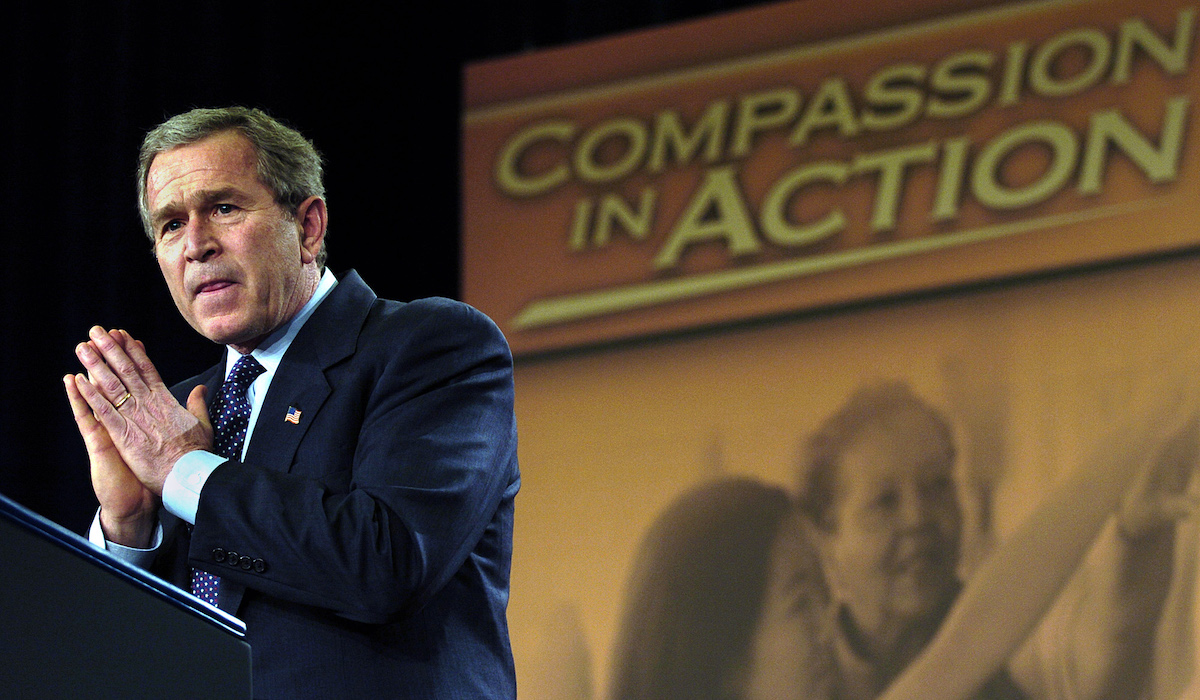My last entry in this series on the compassionate conservatism movement concluded with a question: Would John DiIulio, head of the George W. Bush administration’s faith-based office, insist that religion-based programs, to be eligible for federal grants, be devoid of religious teaching or evangelism? I liked John, but such a prospect seemed bizarre to me, and I knew many evangelicals would see it as a betrayal of campaign promises.
On March 7, 2001, both John and I spoke at the National Association of Evangelicals conference in Dallas. I tried to warn him with a story about the Texas mother who saw her daughter in front of their house milking a cow and talking to a strange man. The mom calls out, “Haven’t I always told you not to talk to strangers? You come in this house right now.” The girl calls back, “But momma, this man says he’s from Washington.” The wise mother replies, “In that case, bring the cow in with you.”
John told the audience not to worry: “We’re taking a deliberative approach and focusing first on conducting our audits, studying competing ideas, weighing competing perspectives, and looking forward to … improving government-by-proxy programs through performance-based grant-making.” He gave as an example of what could not be funded: a “faith-based drug treatment program … urging each beneficiary to accept Jesus Christ as Lord and Savior. Its indivisibly conversion-centered ‘treatment modality’ takes the following form: Your problem is X. To cure X, believe Y.”
That did not go over well at the National Association of Evangelicals, nor with others who prized Teen Challenge and similar groups. What if to cure X, believe J turned out to be the most effective program in helping people beat their addictions? Performance-based grant-making might be at war with a ban on speaking about Jesus.
Under evangelical pressure, the Bush administration temporarily pledged not to require groups “to separate their faith from their teaching and counseling” and not to “discriminate against groups from any religion that stress proselytizing, as long as those in need have the opportunity to choose secular alternatives.” One example: “A class that teaches about budgeting and saving by citing biblical verses as normative will receive treatment equal to that of a program resting on secular wisdom.” Under press pressure, even that small concession later disappeared.
Nevertheless, on May 22, 2001, Bush told leaders of Hispanic faith-based groups that “one of our commitments is that we will work tirelessly to make sure that bureaucracies don’t stifle the very reason you exist in the first place, and the power of your ministries, which is faith.” Two days later he noted in Cleveland that “my administration will do everything in our power to make sure that those who do interface with government never have to sacrifice their mission, their reason for being.” John DiIulio’s chief assistant, David Kuo, wrote in his 2006 book, Tempting Faith, that the poor ministers and tiny charities thought they could “count on George W. Bush’s White House to fight for them.” Not so.
A week after Bush’s speech, I surveyed several hundred gospel mission heads and saw he had not convinced them that the faith-based initiative would help groups that showed strong faith in God. The head of a Toledo Christian homeless shelter recognized that government should not favor one religious organization over another, but “all that we do, whether providing meals or beds or clothing or counseling, all is done to the glory of God and for ONE purpose, to share the gospel of the Lord Jesus Christ and to disciple men and women in Christ. …To deny this is to deny our most basic purpose for being.”
My survey showed that only 4% were positive about a grant-making system. Only 5% favored giving vouchers to the alcoholics and addicts, who made up a big part of their clientele, letting them choose where to go: they said most would choose the least-demanding program. Ninety percent echoed this comment from a ministry head in Pueblo, Colorado: “Any vouchers or direct government grants would NOT be acceptable to our ministry, as these would undoubtedly lead to government controls and restrictions on the Christian religious nature of our ministry.”
Three of every four offered comments like this: “The ONLY one of the possibilities that would be acceptable to our ministry would be tax credits.” A Utica, N.Y., leader said tax credits “empower the donor … discretionary grants are least preferable because the government may award them arbitrarily.” A Philadelphia program head stressed that “Evangelical faith-based organizations cannot segment their programs into ‘religious’ and ‘nonreligious’ aspects. Christ is the center of all we do.” A common thread: “The government does not know what is best. We are on the front lines, not them.”
Rep. Mark Souder (R-Ind.), who died last September, understood that. He talked with two leading Democratic opponents of the grant-centered bill heading to House and Senate votes at the end of June. He found receptivity: “Bobby Scott and Chet Edwards were willing to drop [propose] the $500 tax bill with me. On the [House] floor it sounds like we don’t like each other, but we get along fine.” The tax credit idea died, Souder told me, when DiIulio “stopped me in the corridor and insisted that ‘the president really needs this … we’d really appreciate it if you hold off.’ I had to let the president have his shot.”
The House Ways and Means Committee ignored the tax credit approach but approved a measure allowing the 70% of taxpayers who did not itemize to deduct charitable donations. Deductions are much less potent than tax credits, but still something: the committee, though, capped the allowable amount at $25 for single taxpayers, which would amount to $3.75 in annual savings for the typical non-itemizing, 15%-bracket taxpayer. Souder said that the $25 limit and $3.75 result were “close to insulting.”
Nevertheless, Bush motored to the Capitol to ask wavering Republicans to vote for the House bill that centered on government grant-making. Rep. Joe Pitts described Bush’s talk in a basement conference room: “He was very passionate, obviously committed to this. … You could see he was tearing up. He was saying, ‘Give us a chance.’” Bush did not deal with the question of whether the bill would help groups about which he spoke most highly. He said, “I want you to overlook some of the details and get it done.” It’s unclear why Bush remained wedded to the grant-making approach exclusively, but once he chose DiIulio to head up the administration’s faith-based initiative, it was unlikely that overt evangelism would be allowed in government-funded programs. DiIulio had a strict set of metrics in evaluating programs, and belief in God was not one of them.
The “get it done” plea became a mantra. John DiIulio later recalled: “One senior staffer chided me at a meeting where many junior staff were present and all ears, ‘Get a faith bill, any faith bill.’” Republicans on virtually a party line vote passed the bill, 233-198. If it became law, it would stop some of the most overt kinds of anti-religious bias. Catholic organizations could keep crucifixes on the wall. But allowing religious symbols and banning religious teaching was superficial religious tolerance that would do nothing, Souder said, for pervasively religious organizations that are “the most effective groups in the country.”
The House bill did not allow government funding of groups that made worship services or religious instruction central to their programs. They could set up a parallel organization for poverty-fighting, but they would not be able to incorporate biblical teaching into all their instructional and counseling activities. They could “consider” religion when they hired staff members but would not be allowed to require that a new hire’s “religious practices” conform to theirs.
It all became moot when a question on hiring became prominent in the Democratic-controlled Senate. The Salvation Army wanted to be able to say no to gays and lesbians, and that goal energized hostility from liberal groups. Sen. Joe Lieberman backed away from his support. Majority Leader Tom Daschle said he would not put it on the Senate agenda. The bill died.
John DiIulio in August announced his resignation, citing health concerns, but in 2002 told journalist Ron Suskind that in the White House “on social policy and related issues, the lack of even basic policy knowledge, and the only casual interest in knowing more, was somewhat breathtaking.” John claimed that “Mayberry Machiavellis” filled the White House: they “consistently talked and acted as if the height of political sophistication consisted in reducing every issue to its simplest, black-and-white terms for public consumption.”
Could the faith-based initiative be saved?
This is the seventh installment of an eight-part series on poverty and welfare reform in America. Click through for parts one, two, three, four, five, and six.

